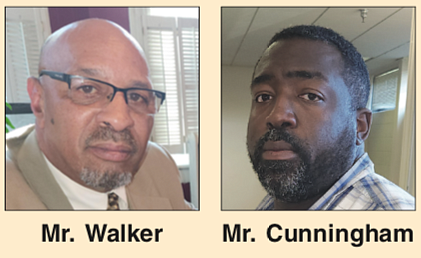High job hopes
Nonprofit offers former convicts free solar training for brighter futures
Jeremy M. Lazarus | 10/27/2022, 6 p.m.
Criminal convictions can be a real barrier to finding work.
Richard W. Walker, a Richmond advocate for the rights of felons, has found a way to open the door to opportunity in a high-demand industry — installing solar panels.
For the past four years, Mr. Walker has been organizing free classes that allow city residents seeking a fresh start to learn the basics of installation in just one week and then connect them with companies looking for workers.
This has been his biggest year yet, with eight classes, and one more in the works.
Those who take the course get classroom instruction and hands-on experience and receive a $200 stipend when they finish, along with an introduction to potential employers, said the 64-year-old New Jersey transplant.
Held in partnership with the city’s Office of Community Wealth Building, which has supported Mr. Walker’s efforts, the latest class began Monday at the East District Initiative in Church Hill.
At least 55 people already have graduated previous classes this year, said Mr. Walker, who said most of the students learn about the classes through OCWB.
Caprichia Smith Spellman, director of OCWB, could not be reached for comment.
Mr. Walker’s initiative comes as solar development climbs rapidly in Virginia and across the country. The Solar Energy Industry Association reports solar is now a $4 billion industry in the state with 179 companies employing nearly 5,000 people.
SEIA projects that employment in solar in Virginia could grow four times in the coming years, fueled by federal tax credits and state laws promoting the growth of renewable energy.
Training people in solar installation also is in keeping with the mission of our program,” said Mr. Walker, a lanky, raspy- voiced man who leads the nonprofit Bridging the Gap in Virginia that he launched 13 years ago.
“Our mission is to empower the formerly incarcerated, at-risk youths, substance abusers, the homeless and veterans by helping them overcome barriers that hinder them from being successful,” said Mr. Walker, a former convict himself whose rights have been restored.
To support the program, he has secured grants from the Mertz Gilmore Foundation and the Richmond-based Community Foundation. OCWB has provided space, but not yet contributed to the program, he said, but added that could soon change.
At this point, Bridging the Gap is the first and only Black organization to provide such training in Virginia, according to a search of online training programs.
There are other programs, most notably the four-year-old SHINE, an acronym for Solar Hands-on Instructional Network of Excellence. A coalition of private and public partners created SHINE in 2018 to create a pipeline of potential employees for solar companies.
SHINE promises to get those who enroll certified as solar installers after just two days of training, which is held at various community colleges.
It is not free. The price for the training is listed at $1,295, though there are scholar- ships that pick up about $770 of the tab for those who cannot cover the full cost.
“The people I serve couldn’t afford that,” Mr. Walker said.
Mr. Walker said he started organizing the program in 2018 during the successful fight to halt Dominion Energy’s efforts to build the Atlantic Coast Pipeline through the Union Hill community in Buckingham County. His family still owns land in Union Hill and opposed the natural gas pipeline.
“I held my first training in Union Hill,” he said. “It was my way of counteracting against Dominion’s fossil fuel pipeline.”
He said he connected with one of the nation’s foremost solar trainers, Sean White of White House Solar of California, who led the first class and several others in Richmond for him.
One of the students who took the course, Duane Cunningham, an electronics and electrical engineer who runs a data center at Langley Air Force Base in Newport News, is now the instructor.
“The reason I am interested in teaching the class is that I come from the same background as many of the students,” said Mr. Cunningham. “I grew up in extreme poverty, and I had no way of gaining access to the opportunities. Even if I had known, there was no way my family could afford the training.”
A former Army staff sergeant, he said he gained access and opportunity after joining the military. He was able to go to college, he said.
But he knows his students are where he was.
“Solar training is very expensive, even though it is a lucrative field,” said Mr. Cunningham. “Not many qualified professionals want to come to inner-city communities to teach. We have many capable people in lower-income areas, but the training they need is out of their price range,” he said.
“Fortunately, this program takes care of that because it is free,” he said.
He said that there is a demand for installers. One company’s owner came to the class to tell students they would have a job if they completed his program, he noted.
“This program is changing lives,” Mr. Walker said. “People who come through our program can walk out with jobs paying $23, $24, $25 an hour.”
He is just hoping that more people will seize the opportunity.







